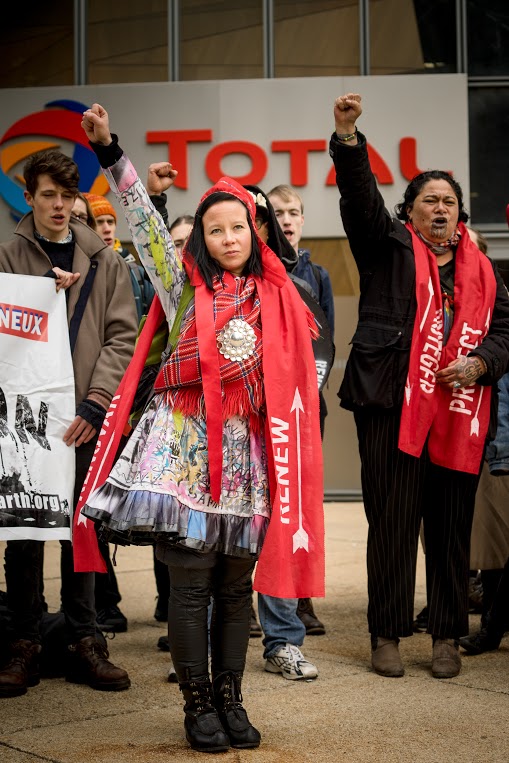
“We are bringing a message of love, of peace, of continuing”
As the COP21 climate negotiations go down to the wire in Paris tonight, the UN Secretary General Ban Ki-moon has said the talks have been the most complicated and difficult he has ever been involved in.
 As the COP21 climate negotiations go down to the wire in Paris tonight, the UN Secretary General Ban Ki-moon has said the talks have been the most complicated and difficult he has ever been involved in.
As the COP21 climate negotiations go down to the wire in Paris tonight, the UN Secretary General Ban Ki-moon has said the talks have been the most complicated and difficult he has ever been involved in.
As the diplomats and politicians from 200 nations fight over the text word by word and line by line, it is increasingly clear there are serious flaws to any agreement.
One of the exclusions will concern the rights of the world’s indigenous communities, many of whom have been at the forefront of recent climate victories such as the stopping of the Keystone XL pipeline and kicking Shell Out of the Arctic.
As I write, the Indigenous Environmental Movement has invited First Nations from across the globe, from North and South America, from the Arctic to the South Pacific, to gather at the base of the iconic Eiffel Tower to hold a powerful and poignant water ceremony.
“The message we are bringing with this action is a message of love, of peace, of continuing”, says Patricia Gualinga, a Kichwa leader from the Ecuadorian Amazon.
During the ceremony, water will be brought from various Indigenous territories from across the globe and there will be the signing of the first International Indigenous Women’s Treaty which is calling for fossil fuels to be kept in the ground.
Over the last few days, the Indigenous communities have become increasingly vocal in working with other climate activists and organisations to keep fossil fuels in the ground and stop so-called “false solutions” such as the UN programme called REDD.
Short for Reducing Emissions from Deforestation and Forest Degradation, REDD is a widely critiqued effort to create a financial value for carbon stored in forests.
For example, REDD has been criticised by Indigenous communities for essentially privatizing the air using forests, agriculture and water in the global south as “sponges for industrialized nation’s pollution.”
 Yesterday, on International Human Rights Day a coalition of impacted communities gathered for a protest at the Peace Wall in Paris calling on the US delegation to reject REDD and other false solutions.
Yesterday, on International Human Rights Day a coalition of impacted communities gathered for a protest at the Peace Wall in Paris calling on the US delegation to reject REDD and other false solutions.
Speaking at the event, Dallas Goldtooth said: “You have to keep fossil fuels in the ground. We must put a moratorium on fossil fuel development. That is the most sincere step we can take to address climate change. Anything else apart from that, carbon trading, carbon markets, REDD, are just false solutions.”
 Also yesterday over hundred indigenous and climate activists undertook a peaceful protest against the energy corporation Total in Paris.
Also yesterday over hundred indigenous and climate activists undertook a peaceful protest against the energy corporation Total in Paris.
Despite the ongoing state of emergency in Paris and the heavy handed Police response to some actions, the protest went ahead with Indigenous Peoples delivering testimonies from the dirty Alberta Tar Sands, the Arctic and also South Pacific.
Daniel T’seleie, a Dene community member said “Indigenous Rights cannot coexist with tar sands exploitation. Colonialism in its current manifestation has Indigenous communities being held as economic hostages by Canada and multinational fossil fuel corporations like Total”.
 Suzanne Dhaliwal, the director of the UK Tar Sands Network added: “People in Europe will continue to stand with frontline communities whatever the outcome of COP21 to stop the expansion of tar sands to global markets.”
Suzanne Dhaliwal, the director of the UK Tar Sands Network added: “People in Europe will continue to stand with frontline communities whatever the outcome of COP21 to stop the expansion of tar sands to global markets.”
So the message coming out from activists and Indigenous communities is – no matter the outcome of the COP21 talks – the climate fight will continue.
And so will the battle to keep fossil fuels in the ground.
Because this is a movement whose time has come.
